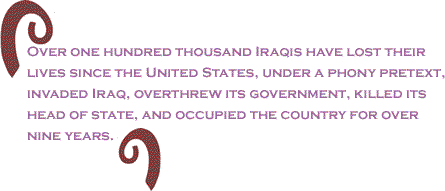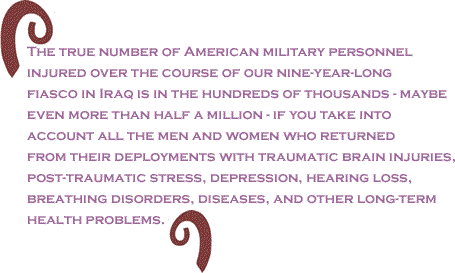Just
as the year was coming to a close, three prominent Iraqi
political figures declared their country �stands on the
brink of disaster.�� Rather than becoming a �a functioning
democratic and nonsectarian state,� Iraq is on the path
to becoming� a sectarian autocracy that carries with it
the threat of devastating civil war,� asserted Ayad Allawi,
named Prime Minister of the Iraqi Interim Government after
the U.S. Invasion, Osama Al-Nujaifi, Speaker of Council
of Representatives of Iraq, and the country�s finance
minister, Rafe Al-Essawi, on the opinion page of the New
York Times. The country �has become a battleground
of sects, in which identity politics have crippled democratic
development.�
The
three men, leaders of the large political non-sectarian
coalition Iraqiya that won the most seats in the 2010
election and represents more than a quarter of all Iraqis,
said they are now � being hounded and threatened� by Prime
Minister Nuri Kamal al-Maliki �who is attempting to drive
us out of Iraqi political life and create an authoritarian
one-party state.� Maliki, the three said, issues directives
to military units, makes unilateral military appointments,
interferes with the courts, has complete control over
Iraqi intelligence and national security agencies, and
serves the interest of Maliki�s Dawa party that controls
the Green Zone and intimidates political opponents.
Their
country, the three politicians said, has become �the Iraq
of our nightmares� in which �the nation�s wealth is captured
by a corrupt elite rather than invested in the development
of the nation.�
It
would be hard to be more dismal that the picture Ali A.
Allawi who previously served at different times has Iraq�s
minister of trade, defense and finance in succession between
2003 and 2006 drew for Time�s readers this week:
 �Agriculture
has effectively collapsed; the great river systems of
Mesopotamia have shriveled; trade routes based on Iraq�s
unique geography have vanished; and transport links have
atrophied. Merchants and entrepreneurs are merely recyclers
of state-owned and state-generated wealth and a previously
open and culturally and religiously accommodating society
has been replaced by beleaguered communities locked in
laagers.�
�Agriculture
has effectively collapsed; the great river systems of
Mesopotamia have shriveled; trade routes based on Iraq�s
unique geography have vanished; and transport links have
atrophied. Merchants and entrepreneurs are merely recyclers
of state-owned and state-generated wealth and a previously
open and culturally and religiously accommodating society
has been replaced by beleaguered communities locked in
laagers.�
For
this over one hundred thousand Iraqis have lost their
lives since the United States, under a phony pretext,
invaded Iraq, overthrew its government, killed its head
of state, and occupied the country for over nine years.
The
U.S. - led coalition forces have lost 4,805 lives in battle,
4,487 of them young women and men from the United States.
The number of U.S. military personnel wounded during the
conflict is officially 32,226. However, Dan Froomkin,
senior Washington Correspondent for the Huffington
Post, has written, �The true number of military personnel
injured over the course of our nine-year-long fiasco in
Iraq is in the hundreds of thousands - maybe even more
than half a million - if you take into account all the
men and women who returned from their deployments with
traumatic brain injuries, post-traumatic stress, depression,
hearing loss, breathing disorders, diseases, and other
long-term health problems.�
Iraq
has come a long way in nine years, from a time when the
promoters of the U.S. invasion promised that the country�s
oil production would cover the cost of the war, to the
day the country � unable to keep the lights on all day
and with an unstable and near prostrate government in
Baghdad�can now purchase over $6 billion in arms, including
36 U.S. F-16 fighters.

The
planes are said to be necessary to protect Iraq�s airspace.
From whom? Iran? Kuwait?� (The U.S. recently sold 209
Patriot missiles to Kuwait for about $900 million).
Similar
question can be asked about our dealings with the tyrannical
regime - women can�t drive, thieves get their hands chopped
off, etc - in Saudi Arabia. Last week the White House
unveiled an arms deal with Riyadh of close to $30 billion,
an agreement that will send 84 F-15 fighter jets and other
military hardware to the kingdom. The deal includes spare
parts, training and maintenance of the 70 advanced U.S.
military aircraft Saudi Arabia already has on hand.
Significant
pro-democracy protests have occurred and been repressed
in Saudi Arabia�s largely Shiites in Eastern Province
all last year.
The
only military operation that country has engaged in recently
was an invasion, along with United Arab Emirates forces,
of neighboring Bahrain to help the autocrats there brutally
put down the local version of the Arab Spring.
Oh,
Bahrain.
Secretary
of State Hilary Clinton has stoutly defended the administration�s
plan to sell $53 million worth of armored Humvees and
missiles to the tyrants there. The argument is that the
sale is necessary to protect the country�s security. But
from whence comes the threat to the tiny nation that would
require armored personnel carriers? Nearby Qatar?
There
is a threat to the repressive Bahraini regime. Last Friday
and Saturday, young people blocked highways throughout
the country in protests against the country�s royal family.
Activists say a 15-year-old boy died after being hit by
a tear gas canister at close range. The weekend clashes
were the latest in pro-democracy protests that have occurred
regularly since early last year.

Saudi
Arabia has also intervened militarily in neighboring Yemen
to suppress popular protests against autocratic rule.
In November 2009 it staged artillery attacks and sent
fighter jets into northern Yemen Thursday in a military
incursion apparently aimed at helping its troubled southern
neighbor control an escalating local rebellion. �The Saudis
� owners of a sophisticated air force they rarely use
� have been increasingly worried that extremism and instability
in Yemen could spill over to their country, the world's
largest oil exporter,� said the Associated Press.
Of
Saudi Arabia, last Friday the Jerusalem Post reported:�
"In a statement released in Honolulu, where Obama
is vacationing, White House deputy press secretary Josh
Earnest said the kingdom had an important role to play
in keeping watch over the region, which has also seen
protests and political turmoil in Yemen.�
A
White House spokesman boasted last week that the Saudi
arms sales would give the US economy a $3.5 billion annual
boost and help bolster exports and jobs. Needless to say,
that�s not the kind of cynical message many people expected
from the Administration they helped elect three years
ago. However, it sweet music in the ears of the U.S. armaments
s industry.
As
if the pot had not been sweetened enough, last week the
U.S. sold the United Arab Emirates an advanced antimissile
interception system for $3.5 billion as part of what Reuters
described as �an accelerating military buildup of its
friends and allies near Iran.� The deal includes a contract
with Lockheed Martin to produce the highly sophisticated
Terminal High Altitude Area Defense, or THAAD, weapon
system. The White House has also formally proposed to
sell 600 "bunker buster" bombs and other munitions
to UAE for $304.

Lockheed
Martin issued a statement saying the company is happy
with the U.S.-UAE agreement on the first foreign sale
of the THAAD system, Tom McGrath, a company vice president
and program manager, said in a release. "We look
forward to working with our customers to deliver this
important capability," it said.
Needless
to say, the official explanation for this rash of arms
sales in the Gulf region is, in the words of the Associated
Press, �part of a larger U.S. effort to realign its
defense policies in the Persian Gulf to keep Iran in check.�
The problem here is that Iran is threatening none of its
neighbors.� If the concern is Teheran�s nuclear program,
fighter jets are unlikely to deter it. That is unless,
the sudden accelerated transfer of military hardware is
in preparation for the attack on Iran being promoted by
hawks in Tel Aviv and Washington.
The
aim of this military buildup is to secure the allied regimes
in the Middle East, no matter how odious. In the process,
matches are being strewn amid a tinderbox.
Jason
Ukman of AFP reported that, �the Obama administration
has sought to bolster its security relationship with Riyadh,
despite their differences over the response to the Arab
Spring.�� Whatever those difference might have been, this
new level of strategic coordination is really aimed at
keeping the popular uprisings in the Arab world from bleeding
over into the oil-rich Gulf.
�This
sale will send a strong message to countries in the region
that the United States is committed to stability in the
Gulf and broader Middle East,� said Andrew Shapiro, assistant
secretary of state for political-military affairs.� However,
critics of U.S. policy toward the Gulf nations maintain
that the arm sales only strengthen the forces of reaction,
and that the �increased tensions� cited to justify the
closer ties is actually an expression of the popular revolt
in the region. And that the arms shipments are intended
to prevent its successful spread to the Gulf monarchies.

Evidently,
the Obama Administration�s commitment to the notion of
�Arab Spring� and promoting �democracy� in the Middle
East is quite selective. While acting boldly to shore
up the autocracies in the Gulf region, �senior U.S. officials
are reported to be quietly preparing options to help dissident
groups seeking to topple the reactionary government of
Syrian President Bashar Assad,� according to UPI. There
are also reports of �a 2,500-person Arab intervention
force" � mainly Libyan and Iraqis�on tap in Qatar,
ready to invade Syria.
The
invasion and occupation of Iraq was all about oil, and
the current effort to militarily shore up some of the
most reactionary regimes in the Middle East is all about
oil. The amazing thing is that even after it became obvious
that the Iraq war had nothing to do with mythical �weapons
of mass destruction,� the U.S. political establishment
and the major mass media wouldn�t say it. It�s not that
they don�t realize it; they just wouldn�t say it. They
won�t connect the trillions of dollars worth of arms now
being flooded into the region with petroleum. They still
portray the Bush Administration�s invasion of Iraq as
an effort to plant democracy and the current jet fighter
sales as an effort to promote �stability in the Gulf and
broader Middle East.�
As
the new year gets underway, it is quite obvious that U.S.
policy and actions, under either the Bush or Obama Administration,
has brought anything but �democracy� to Iraq, and the
military buildup now underway is hardly going to bring
�stability� to that devastated country or to the region.

BlackCommentator.com
Editorial Board member Carl Bloice is a writer in San
Francisco, a member of the National Coordinating Committee of
the Committees of Correspondence for Democracy and Socialism
and formerly worked for a healthcare union. Click here
to contact Mr. Bloice.

